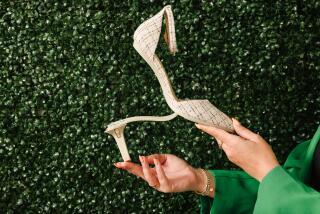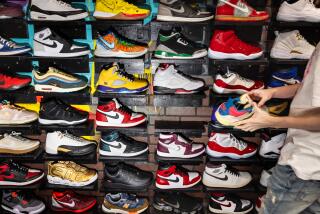Sandal-Maker Alleges Wal-Mart Copied Design
- Share via
FLAGSTAFF, Ariz. — At first glance, the sandals John Kalinich holds in his hands are nearly identical: A series of multicolored nylon straps anchored to a black rubber sole.
And that, Kalinich says, is the problem.
His company, Teva Sport Sandals, has a patent for the sandal he holds in his left hand. The sandal in his right hand is sold by Wal-Mart Stores Inc. without Teva’s permission, Kalinich says.
“It’s very disturbing that the nation’s largest retailer has to copy a small inventor to make a buck,” says Kalinich, Teva’s chief operating officer.
Flagstaff-based Teva is suing Wal-Mart, accusing the retailer of infringing on Teva’s sandal patent, its copyrighted fabric patterns for the sandals’ straps and its unique designs for the sandals’ soles. Teva sandals sell for an average of $60 per pair, Kalinich said, while the Wal-Mart sandals sell for as little as $10.
U.S. District Judge Roger Strand has scheduled a Jan. 21 hearing in Phoenix on Teva’s request for a court order barring Wal-Mart from selling any more of the sandals.
Betsy Reithmeyer, a spokeswoman at Wal-Mart’s headquarters in Bentonville, Ark., did not return calls seeking comment.
The Teva case could be a multimillion-dollar headache for Wal-Mart, which lost a $6-million judgment to Nike last year in a similar case involving Nike’s Air Mada outdoor shoes. If Wal-Mart loses, the retailer could be forced to stop selling the sandals, pay Teva’s legal fees and turn over any profits it made on the challenged sandals.
Teva sold 1.7 million pairs of its sandals last year, while Wal-Mart did $1.6 billion in total footwear sales, Kalinich said.
“The damages can be enormous,” said Barry Evans, a New York patent lawyer who is not involved in the sandal case. “There are very hard consequences for the knockoff artists by way of damages for the lost profits.”
Patent infringement lawsuits are now familiar territory for Teva, which began in the 1980s after Colorado River guide Mark Thatcher patented his design for a sandal that could be worn while boating, swimming or hiking. Teva has sued 16 times to protect its patent, scoring out-of-court settlements against retailers such as Sears and Kohl’s and shoe stores such as Kinney and Payless, Kalinich said.
Retailers selling lower-cost copies of patented or trademarked products is “not at all unusual,” said Edward Colbert, a Washington patent and trademark lawyer whose clients have included the Home Shopping Network and the U.S. Olympic Committee.
Some retailers see patent infringement lawsuits as just another cost of doing business, and others do not keep track of whether the goods they sell are patented elsewhere, Colbert said.
“There’s a substantial amount of money that’s involved in any product line that goes out. Often these products move very fast,” Colbert said.
Thatcher and Kalinich said their experience shows that U.S. laws on intellectual property--patents, trademarks and copyrights--need to be tightened.
“We shouldn’t have our own companies in the U.S. copying our ideas,” Kalinich said. “We have Wal-Mart stealing our ideas. To us, that’s horrifying.”
More to Read
Inside the business of entertainment
The Wide Shot brings you news, analysis and insights on everything from streaming wars to production — and what it all means for the future.
You may occasionally receive promotional content from the Los Angeles Times.










